How One LDS Convert from Nepal Follows Christ by Serving the “Forgotten Children”
Contributed By Aubrey Eyre, Church News contributor
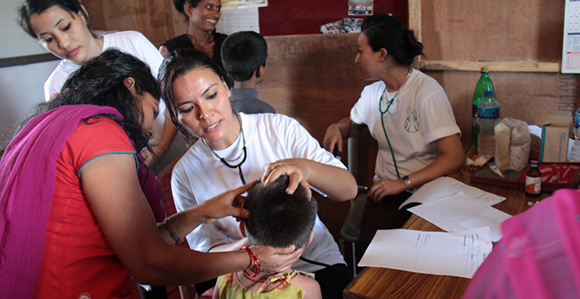
Usha Maharjan serves children in the slums near Chitwan, Nepal.
Article Highlights
- She was the first Christian convert in her family.
- She was one of the first Nepali women to work in high-powered hospital administration.
- Now she gives children hope for a successful future.
“They’re giving them hope. … They’re helping the kids to realize, especially the girls, that they aren’t second-class citizens.” –Beth Dearden of World Link Partners
Related Links
In 2012, Usha Maharjan was a woman on the rise, breaking barriers and pushing past the glass ceiling in her native Nepal. As a doctor and hospital administrator at Chitwan Medical College, she was a uniquely prestigious and highly paid female who was regularly saluted by her staff and colleagues. She had the kind of education, money, and authority that nearly everyone was striving for, yet she felt she needed to be doing more.
A woman of firsts
Compared to most Nepali children, Maharjan had what she describes as a “pampered” childhood. Her parents were hard-working tenant farmers who were granted land of their own due to a change of law during the 1960s and became wealthy overnight. But with no education of their own, they put a heavy emphasis on educating their children, and as the baby of the family, Maharjan was given the opportunity to attend private schools, where she excelled.
“My mom wanted to make sure I had the best education possible,” Maharjan said. “We didn’t have a GPA systems … but I was always first, … so they jumped me ahead twice, and again I was the number 1.”
With her natural aptitude for learning quickly and her willingness to work hard in school, Maharjan was able to qualify for medical school, and, although it was not the career Maharjan had initially envisioned for herself, she decided that it would be a good path to follow after receiving a scholarship.
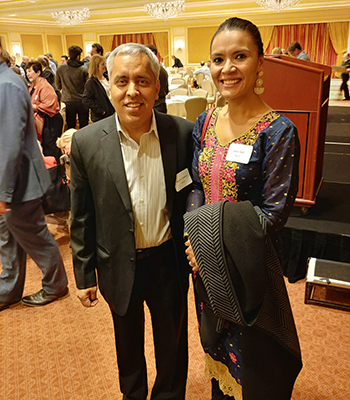
Usha Maharjan with her mentor, Bishnu Adhikari, at a charity event in Utah. Photo courtesy of Usha Maharjan and Randall Wall.
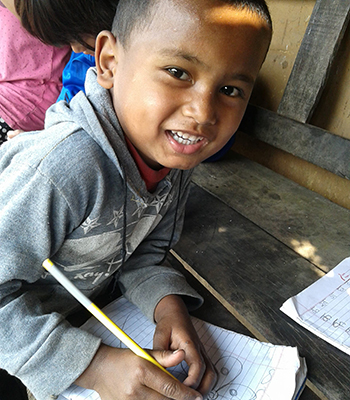
A young boy in Nepal learns in an open-air classroom. Although most of the students in the slums are girls, Maharjan says they are working to help young boys stay interested in education. Photo courtesy of Usha Maharjan and Randall Wall.
It was during her time as a medical student that she was first introduced to Judeo-Christian values, and she became the first in her family to convert to Christianity.
Maharjan was raised Buddhist and Hindu, like most Nepalis, but she said she never felt that she understood the purpose of life from their teachings. After receiving a Bible from a friend in medical school, Maharjan began investigating different forms of Christianity. During this time, she met someone she described as the gray-haired American doctor, who introduced her to a knowledge that changed her life.
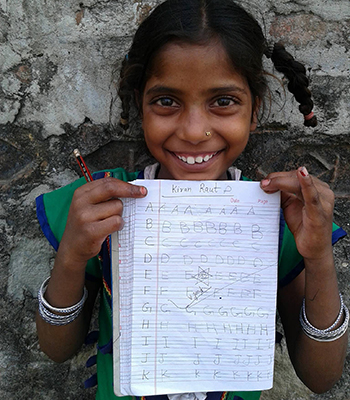
Children from the slums cannot get an education without help from resources outside their families. Photo courtesy of Usha Maharjan and Randall Wall.
When Maharjan met Dr. Darrell Thueson, he was serving as an instructor in an emergency room with LDS Charities. On the second day of class with Dr. Thueson, Maharjan marched up to him and asked if he was Christian.
“We had been hammered in the MTC to not talk about the LDS Church,” Thueson explained, stating that he was hesitant to answer her question. When he finally told her he was indeed a Christian, she handed him a stack of religious pamphlets of another church, which she was investigating at the time, and asked if he would read them so they could discuss them. Seeing an opportunity with someone who was interested in learning more about Christ, Thueson began to meet with her regularly to discuss the gospel.
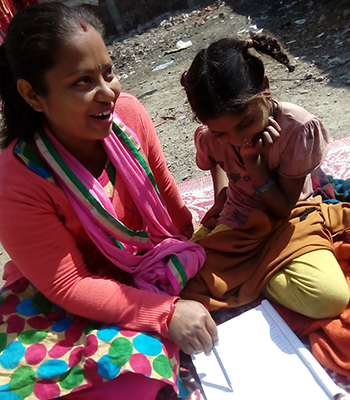
Students in Nepal learn while sitting on blankets in open-air classrooms. Photo courtesy of Usha Maharjan and Randall Wall.
When it came to the Book of Mormon, however, Maharjan was skeptical and repeatedly told Thueson she did not like the stories it contained.
“After about a year, I decided to end contact,” Thueson said. “I prayed to God and said I had done everything I knew how to do, and I left it in His hands.”
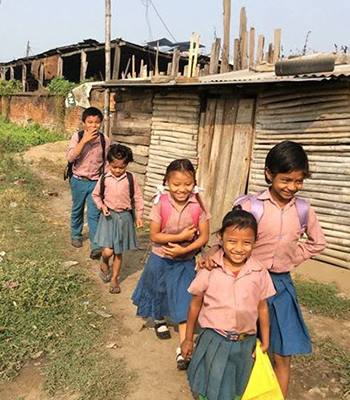
Students in Nepal are required to wear uniforms, even to the public schools. Photo courtesy of Usha Maharjan and Randall Wall.
It was about this time that Maharjan, without Thueson’s knowledge, had begun seriously reading on her own the copy of the Book of Mormon he gave her.
A few months later, Maharjan called Thueson and said, “Hello Dr. Thueson, I know the Book of Mormon is true. I know that the Church is true. Can I be baptized tomorrow?”
As the first in her family to convert to Christianity, and the first to convert to The Church of Jesus Christ of Latter-day Saints, Maharjan felt compelled to share the gospel with others as it had been shared with her.
Following her baptism, and after completing medical school, Maharjan decided to turn in her mission papers. And feeling the need to go where the Lord most needed her, she sent her papers in with a specific request to not be considered for service only in India as most Nepali missionaries were at the time. Among the first once again, Maharjan was called to serve in the United Kingdom.
“I was called to the England Birmingham Mission, and it was a life-changing experience,” she said. “That mission helped me to know that service is joy and that when we help others, we are blessed and we are happier.”
Upon returning from her mission, her branch president, Bishnu Adhikari, who is well known for his role in the Meet the Mormons movie, encouraged her to apply for a master’s of hospital administration in India.
“He just read my mind,” Maharjan said. “I was really happy that I could go to India, and when I got back I was offered a position in a big hospital.” She was counted among the first women to hold such a high-powered hospital administration position in the country.
A prompting to do more
Having been blessed by so many opportunities throughout her life, Maharjan explained that she was acutely aware of the lack of opportunities available to many people around her.
During her time as a hospital administrator, Maharjan was touched by what she saw every day on her way to and from work.
“I used to pass by the slums every day,” Maharjan said. “And I just felt something needed to be done there. I didn’t know what to do, but I knew that something needed to be done.”
Pulling from the Chinese proverb that teaching a man to fish will serve him better than simply giving him a fish, Maharjan explained that she and a few friends from the medical college felt the need to do something that would have a lasting impact and create opportunities that had been withheld from people simply because of the circumstances into which they were born.
Randall Wall, Maharjan’s husband, explained that most of the children in the slums are the poorest of the poor in Nepal. They are part of the untouchable caste known as the Dalit and are rejected by much of Nepalese society. With high mortality rates due to malnutrition as children and low literacy rates, particularly among women, these “forgotten children” face many social challenges that can be improved if they are provided with the right opportunities.
So, after only two and a half years in her position at the hospital, Maharjan quit her job and, with the help of a few friends, started a grassroots organization now known as Eternal Hope Nepal, which works to educate children in the slums.
“My friends were shocked when I resigned, … and my family yelled at me,” Maharjan said.
Wall explained that “jobs are hard to come by in Nepal, even for doctors.” For Maharjan to give up such a position was not an easy thing.
“But I really felt prompted that I should do that. … I knew there was something bigger,” Maharjan said.
Using her savings to fund her work and living off of just a few hundred dollars a month for herself, Maharjan and her medical school friends began using Montessori methods—based on self-directed activity and hands-on learning—to educate children from the slums in open-air classrooms.
In each new area, they begin with a group of perhaps 20 children and three or four adults on a blanket on the ground. The goal, Wall explained, is to get them up to grade level so they can join public school.
“We still have to monitor them in the public schools because they’re the untouchable class. … But if [the teacher and administrators] know we’re watching over them … they’ll treat those kids fairly,” Wall said.
Wall joined in the humanitarian efforts in Nepal shortly after meeting and marrying Maharjan a little over three years ago. He explained that working with these children has changed his life and what he considers to be important.
“It’s the only thing that’s ever truly made me happy,” Wall said.
“Me too,” Maharjan said. “Humanitarian work is addictive. It’s very addictive. I just love it.”
And considering her work not only with Eternal Hope Nepal but also her time serving as the Nepali country representative for the humanitarian organization Days for Girls, Maharjan’s actions are true to her word. Serving others is what she feels called to do, and she loves it.
Following in Christ’s footsteps
Like everything in her life now, it is her love for Christ and her desire to follow His example that steers Maharjan’s actions and efforts.
“The impact they’re having on these kids is that they’re giving them hope,” said Beth Dearden of World Link Partners, an organization that supports Eternal Hope Nepal with funding and resource connections. “They’re helping the kids to realize, especially the girls, that they aren’t second-class citizens.”
And it is Maharjan’s example and her actions toward the Dalit children that play a big part in communicating that to the children.
“[Maharjan] comes from an upper caste,” Dearden said. She explained that the upper and lower castes are meant to never interact with or touch one another, but that Maharjan “just rolls up her shirt sleeves and gets right out there, both she and her sister, going to visit the families. She is the most humble, wonderful person.”
Both Dearden’s and Wall’s descriptions of Maharjan and her efforts are reflective of the language used to describe Christ going among the children and blessing them one by one.
“It’s a remarkable story of a remarkable woman in a culture where women are not valued that much,” Dearden said, speaking of why she admires Maharjan’s story and the work she is doing. “It’s good to have someone who’s a woman to look to [as an example], … you know, someone who really comes right up from the bottom, and she’s done it all on her own. That I think is really worth something.”
Maharjan attributes her experiences to the guiding hand of the Lord.
“I feel that everything good and bad that happens, it is God’s plan,” Maharjan said. “Everything that happened, the obstacles that I went through, was an opportunity to be better.”
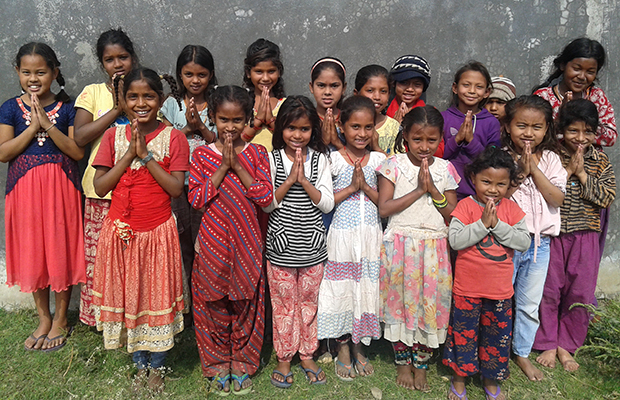
Students in the slums show the traditional “Namaste” greeting of Nepal. Photo courtesy of Usha Maharjan and Randall Wall.
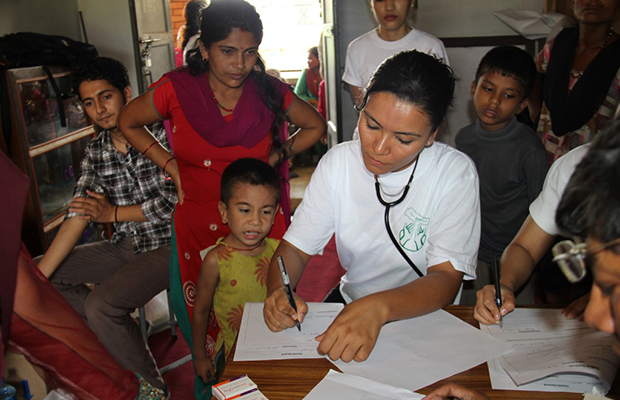
Usha Maharjan works with Nepali children in the slums near Chitwan, Nepal. Photo courtesy of Usha Maharjan and Randall Wall.
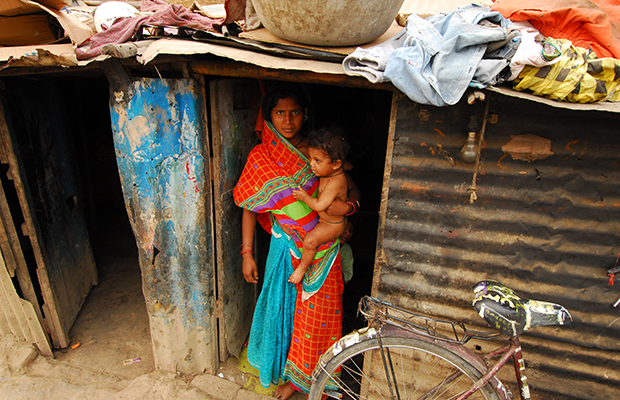
Young mothers in the slums near Chitwan often have no formal education. Photo courtesy of Usha Maharjan and Randall Wall.
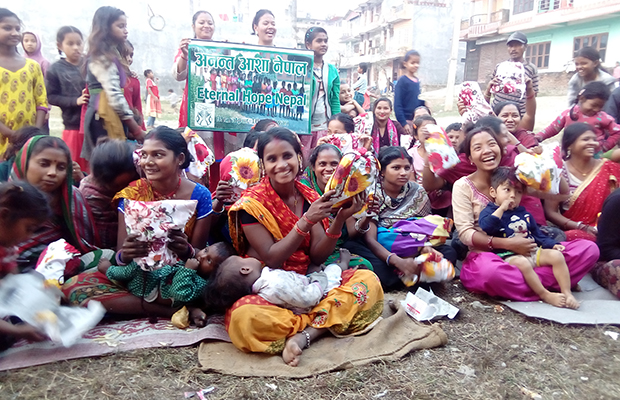
Students of Eternal Hope Nepal. Photo courtesy of Usha Maharjan and Randall Wall.
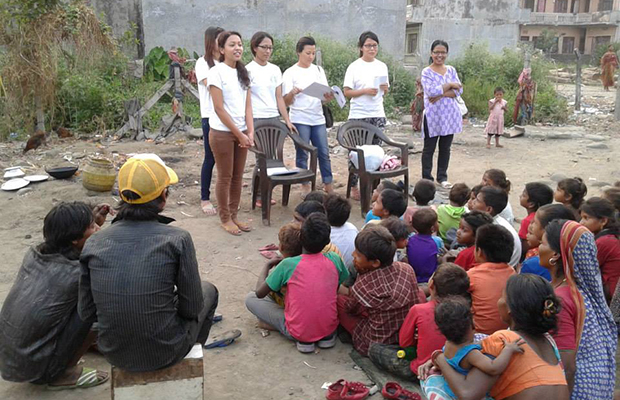
Volunteers and teachers use Montessori methods to help students catch up to grade level before entering the public schools. Photo courtesy of Usha Maharjan and Randall Wall.
